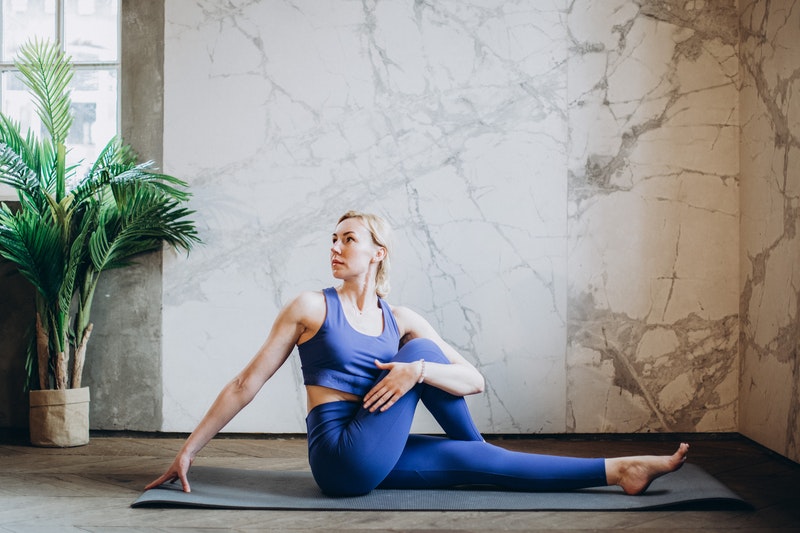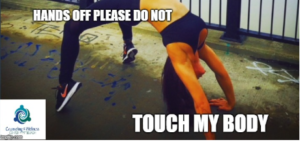
Hands off-Please Do Not Touch My Body, Yoga and Consent.

Consent, Please Do Not Touch My Body
Hands off-Please Do Not Touch My Body.
Closeness is sacred and powerful, and we should share it however we would like with a partner or partners with whom we have provided consent. Personally, I am a ‘toucher’, meaning I am a person who enjoys touch with my partner, someone who hugs family and friends and genuinely savors safe closeness. As we all know, touch can feasibly happen in many contexts. A recent trip to a local yoga studio has spurned some inspiration for considering consent and what exactly that means within the context of yoga. Consent is one of the topics of the century, the importance of asking for it, and heeding to it are championed issues with personal, psychological, and legal context. When we are on our yoga mat, we are presumably in a safe zone, we practice yoga to be well, to relax, to be inside of our bodies, to give life and expression to what our physical selves need in the moment to create our highest expression of safety, openness, and comfort. We rely upon the professionalism, understanding, and care of our yoga instructors while we are on the mat. When others take liberties with our bodies, reactions can range from uncomfortable to traumatic, yet we shouldn’t need to rely upon trauma informed yoga instructors to be the only providers who can offer a style of instruction which provides opportunity to say “No thank you, please do not touch my body.’ From chaturanga to shavasana, we find our bodies configuration of the posture as the yoga instructor cues. Without making space for hands off adjustments, one well-intentioned yoga instructor can inadvertently have a negative impact upon his or her student’s practice, day, overall wellness by taking liberties with his or her student’s bodies.
Consent means that one has asked for permission to approach another person in any way, whether that be to touch, to enter an intimate encounter, or even to provide unsolicited verbal feedback, we should always ask before encroaching upon others. After asking for consent, we wait and pause for that person to respond with their response of approach or avoid. A key component of consent is that the other person is truly able to say ‘no,’ if we are in a position of power, or if we are asking a person who is intoxicated, a minor, or incapacitated in any way, then the other can not provide for their own consent. Under normal circumstances, then, if and after we have been given permission to ‘approach’ we take it a step further to check in to be completely sure that non-verbal permission has been granted to continue or deepen the exchange. Physical space, proximity, and closeness are very special, they are exchanges which can lead to bliss, warmth, bonding, relaxation and even orgasm in the right time. When touch is used subversively, to coerce, to control, to harm, physical connection can become shrouded in horror, it also has the potential to instill anxiety, fear, terror, panic, and pain.
Consensual sexual intimacy is the gold standard, we should always be sure that we are well within the green zone of any boundaries of any person who we are touching and to also always note that we are creating safety for others as we strive for mutual enjoyment and pleasure. There are many contexts or situations where touch happens from fitness instruction, personal training, yoga instruction, little league coaching, physical therapy, massage, and medical settings. While there are many of the medical and physical instructors listed above who do check in and ask, ‘is it ok for me to adjust you.’ The best ones who follow this question by ‘does this feel ok for you’ and to them I applaud their insight and wisdom to always, in all settings, to ask first and wait for an enthusiastic ‘yes’ or a clear non-verbal head nod which unambiguously encouraging procession. For other yoga and fitness instructors, it may be less obvious that they should ask for consent before breaking the touch barrier with students. Let us examine consent from a trauma informed perspective and look at some ways that we can be sure we are always providing supportive and caring touch.
Regardless of the setting or context, we do not have permission to touch another person until we have asked for it and they have given it. For a trauma survivor it can be very triggering and alarming to feel a person, even a coach or instructor grabbing at them, or tapping on their body, for another person to move ones legs or touch ones hands. Feeling safe and giving permission for these things to happen is vital and walking into a yoga studio to practice does not provide consent for one’s physical boundaries to be violated. Just as walking into a bar or nightclub in a low-cut blouse is not the same as providing consent for someone to touch our breasts. Being a woman out late having drinks is not an invitation to have sex, we need a society which is built upon making space for ‘Yes’, or ‘No’ by always ask first. Yoga and fitness instructors, we are here, we want to participate in a fun and fulfilling way but ask before touching please. Additionally, for some instructors who may have a style of delivering their teaching that is very directive and assertive, it may feel punitive to some students.
Recently, in an all levels class, the instructor was someone I had never practiced with before. The class was much less than an all level class, it was more of an intro in my experience, we were cued to move into postures without much attention to how we flow through the sequencing. In any event, after 15 minutes or so warming up, we were cued to do some Sun A’s. When forward folding the instructor told everyone to grab a two blocks in anticipation of their hands not hitting the ground. I have long arms, and have been doing forward folds for many, many, years, it does not tax my body to fold forward and I find it delicious and restorative. The teacher stomped back to me and said ‘No! get your blocks, do not go into your deepest fold!’ In knowing my body, and knowing that I did not need the blocks I started to reach for them to appease her as she began grabbing my leg and tapping rapidly and harshly onto the front of my quad with her pointed finger tips and squinted eyes, ‘Move! Move! Move!’ she commanded. What started as a day of wellness, mindfulness, and an attempt to let myself feel peace, quickly became a source of discomfort and anxiety.
Being a yoga instructor is a big responsibility, it is a pathway to open ones consciousness, those blissed out happy vibes and chakras can really open up and make others aware of themselves, their feelings as well as anything happening with the instructor. We should encourage yoga instructors to have a higher level of insight into their style of relating to others so that the instructor is not unconsciously projecting their own unmet needs or style onto all of those who they come into contact with. The yoga instructor should be very aware of how of tone and content of speech particularly as adjustments are being made. If an instructor is simultaneously speaking in a critical or cold tone ‘move!’ ‘faster!’ ‘in, in, in;’ in a style that feels like they are spitting commands to the students, if the instructors speak this way while grabbing at a students body, it may become even more likely that they are making others feel tense, uncomfortable for anyone, and furthermore this kind of tone and motion can even be panic inducing for some trauma survivors.
More than ever, we must seek to create safety, to speak with love, to be sure that we are providing physical touch which is tender, and warm, and supportive or not tender and warm, if that is the kind of touch which is consensual and agreed upon by those who can legally and actually provide consent. Speak and act with awareness and care for other people’s feelings, doing fitness, pilates, doing a forward fold or downward facing dog, or even having a suspicious mole removed from our bodies are things that must happen peacefully and respectfully, and always with particular attention to any person’s ability to state, ‘No thank you- please do not touch my body’.
Be well,
Stephanie Wijkstrom, MS, LPC, NBCC
Counseling and Wellness Center of Pittsburgh
830 Western Avenue Pittsburgh Pa
and
Counseling and Wellness Center of Pittsburgh – In Monroeville
2539 Monroeville Blvd Monroeville Pa 15146
For more reading on the ethics of touch in yoga;
https://www.yogajournal.com/teach/the-ethics-a
Related Posts
Therapy and Counseling, Treatment For Anxiety
Treatment for Anxiety Treatment for anxiety takes many forms, there are...
How to Get the Most Out of Therapy
If you’re here, congratulations on taking the first step and beginning therapy!...


